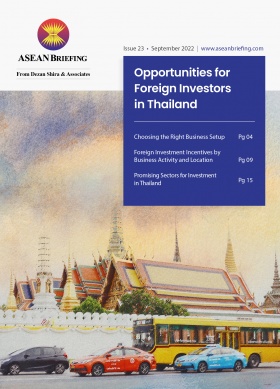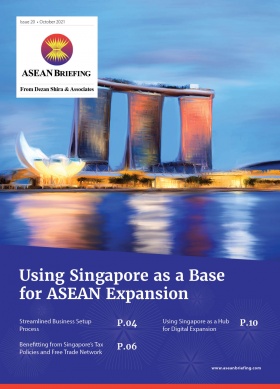Singapore as a Base for French Investment and Expansion in ASEAN
Singapore and France have enjoyed a long history of bilateral relations, with France being one of thirteen countries to recognize Singapore’s independence in 1965. Since then, bilateral trade has steadily grown, reaching over US$15 billion in 2021.
Now Singapore has become an essential base for not only French companies looking to establish their regional headquarters but also a base for expansion into other Southeast Asian markets. As such, over 1,900 French companies in the city-state cover a wide range of sectors from electronics to finance to aerospace.
A robust relationship built over the years
The trade in goods and services between Singapore and France was impacted by the pandemic, and although total trade did slightly improve by 0.8 percent in 2021 according to the Direction Générale du Trésor, it was still 24 percent lower compared to 2019.
In 2021, Singapore was France’s 12th largest trading partner. France saw over US$8 billion worth of exports to the city-state in the same year. This included perfumes, and cosmetics products (US$1.51 billion), garments (US$1.1 billion) beverages, spirits, and vinegar (US$1.09 billion), electrical and electronic equipment (US$1.02 billion), aircraft, spacecraft (US$841 million).Meanwhile, Singapore exported more than US$3 billion worth of goods to France in 2021 which mostly comprised electric and electronic equipment (US$1.48 billion), pharmaceutical products (US$473 million), and machinery, nuclear reactors, and boilers (US$390 million).
French companies expanding their presence in Singapore
For instance, French multinational energy company TotalEnergies has had its regional headquarters in Singapore since 1982 and expanded its office in 2019. In 2021, French utility company Engie announced that it will double its research and innovation team in Singapore over the next three years and collaborate with local higher education institutions to focus on low-carbon cooling systems, the integration of renewable energy, and the greening of data centers. The move was supported by the Singapore Economic Development Board.
Soitec, the French chipmaker, announced in 2021 a multi-million-dollar upgrade for its factory (a 300 mm silicon-on-insulator wafer fabrication plant), and in 2022, amid the ongoing global chip shortage, Soitec planned to add US$ 570 million to its initial investment thus doubling the size of its factory.
What are the opportunities for French companies in Singapore?
The digital and green economy
Southeast Asia’s green sector will see US$1 trillion in economic opportunities by 2030 but only US$ 15 billion has been invested in the last 2 years with the majority of investments poured into the solar, wind, hydro, and geothermal industries.
Singapore also wants to achieve net zero emissions and recently launched the Green Plan 2030 to advance the national agenda on sustainable development and strengthen the country’s commitments under the UN’s 2030 Sustainable Development Agenda and Paris Agreement.
The Green Plan features five key pillars: city in nature, sustainable living, energy reset, green economy, and resilient future. Further, the government was to quadruple solar energy deployment by 2025, reduce household water consumption, expand the rail network, and become a leading center for green finance and services to facilitate Asia’s transition to a low-carbon and sustainable future. The Government will work in partnership with the private sector and has announced that up to US$ 25 billion of green bonds will be issued by 2030 to attract investors.
In addition, the France-Singapore Digital and Green Partnership (“DGP”) was signed on March 14, 2022. and aims to develop a work plan comprising cooperative projects in sectors such as smart transport, smart cities, cyber, financial innovation, agri-food technologies, MedTech, and EduTech. The DGP will ease and support public-private partnerships and private sector-led approaches in digital and green activities to boost Singapore and France’s competitiveness.
The logistics industry
Singapore has recently been crowned by the Leading Maritime Cities report as the world’s largest container transshipment hub and the second-largest container port behind Shanghai. The freight and logistics market is expected to reach a value of US$ 114.81 billion by 2023. In addition, the sector is expected to grow at a rate of eight percent during 2022-2027, which will be supported by the booming e-commerce economy in the region.
The logistics sector is one of the pillars of the Singapore economy and represents a major opportunity for French companies. Further, with the implementation of the Regional Comprehensive Economic Partnership (RCEP), trade cooperation in Southeast Asia will continue to grow, thus driving demand for space and efficient logistic systems.In 2022, Singapore launched its refreshed Logistics Industry Transformation Map (ITM) 2025 along with the Sea Transport ITM 2025 to strengthen its position as a world-class logistics hub and to seize opportunities from shifts in global supply chains. With its Sea Transport ITM, Singapore aims to grow the sector’s value-add by 2-3 percent between 2020-2025 to reach US$2 billion.
Agri-food Sector
Agri-food is another promising sector for French investors in Singapore. In 2019, the city-state launched the “30 by 30” food security goal to reduce its reliance on the world for its food needs. More than 90 percent of Singapore’s food is currently imported and with the “30 by 30” food security goal, Singapore intends to produce 30 percent of its nutritional needs locally and sustainably by 2030.
The agri-food sector has been rapidly developing, with more innovative companies setting up in Singapore and coming up with technologies improving production yield and sustainable food solutions. Next Gen Foods (the plant-based food manufacturer) and Cremer Sustainable Foods (a joint venture established between the German multinational Cremer and Temasek’s Asia Sustainable Foods Platform) are among the firms driving the sector.To support the transformation of a more productive and resource-efficient agri-food sector, Singapore launched a new US$45.2 million agri-food cluster transformation fund in 2021. It comprises three co-funding components for local farms to harness technology that can boost domestic production through capability upgrading, innovation and test-bedding, and technology upscaling. The fund is available for applications until December 31, 2025.
Other key factors as to why French companies invest in Singapore
A pro-business environment
Singapore is globally renowned as a business-friendly destination that offers a stable socio-political environment, a free market economy, highly efficient infrastructure, and an attractive tax regime.
As such, a primary advantage of Singapore is its ability to act as a centerpiece for the holding and management of regional assets. Holding companies are a vital component of any international expansion strategy, and Singapore offers investors a stable environment from which to administer operations in more speculative markets in Asia.
Registering a company can take as little as one day — provided all the files are in order and the minimum paid-up capital is only S$1 (US$0.73).
Taking advantage of Singapore’s double tax agreement network
Singapore has one of the world’s most extensive DTA networks, attracting international businesses from a multitude of conventional and niched industries. The country has signed over 90 DTAs, which comprise three types: comprehensive, limited, and exchange of information arrangements (EOIAs).
Comprehensive DTAs provide relief from double tax for all income types between the two signatories. Limited DTAs, however, only provide relief from income generated from air transport and shipping, and EOIAs are provisions for the exchange of tax information. The France-Singapore DTA has been effective since August 1975.
Singapore’s extensive free trade agreements
Despite regional players maintaining strong FTA networks, they are not as extensive as Singapore’s. Due to these factors, the country will continue to be the default location for businesses seeking to expand into Southeast Asia and neighboring regions.
The country’s 14 bilateral and 13 regional FTAs include some of the largest combined trade agreements in the ASEAN-China, ASEAN-India, and ASEAN-Hong Kong trade blocs — providing Singapore-based businesses with access to preferential markets, free or reduced import tariffs, as well as enhanced intellectual property regulations.
Singapore’s soft approach to business
Singapore is well-placed to help investors navigate the challenges and opportunities presented by ASEAN markets: its efficient setup procedures, competitive tax environment, and integrated supply chains have helped Singapore surpass traditional holding locations in the region, such as Malaysia, and compete with well-established global investment destinations like Hong Kong.
But there are softer factors that make Singapore ideal for businesses that want a regional headquarters to expand into ASEAN and Asia.
Singaporeans share various cultural and linguistic connections with ASEAN members, while English is the main working language. The country’s highly skilled labor force is equipped to act as an intermediary for investments in Asia while maintaining the capacity to communicate with investors from abroad.
Related Reading
- An Alternative Path to Market Entry in Asia – PEO in China, Vietnam, Singapore, Indonesia, and India
- Remotely Establishing Entities in Asia: China’s Mainland vs. Hong Kong vs. Singapore
- An Introduction to Doing Business in Singapore 2022
About Us
ASEAN Briefing is produced by Dezan Shira & Associates. The firm assists foreign investors throughout Asia and maintains offices throughout ASEAN, including in Singapore, Hanoi, Ho Chi Minh City, and Da Nang in Vietnam, Munich, and Esen in Germany, Boston, and Salt Lake City in the United States, Milan, Conegliano, and Udine in Italy, in addition to Jakarta, and Batam in Indonesia. We also have partner firms in Malaysia, Bangladesh, the Philippines, and Thailand as well as our practices in China and India. Please contact us at asia@dezshira.com or visit our website at www.dezshira.com.
- Previous Article Indonesia Hosts the G20 Summit: Opportunities for Foreign Investors
- Next Article Malaysia’s General Election on Nov 19: A Quick Guide








